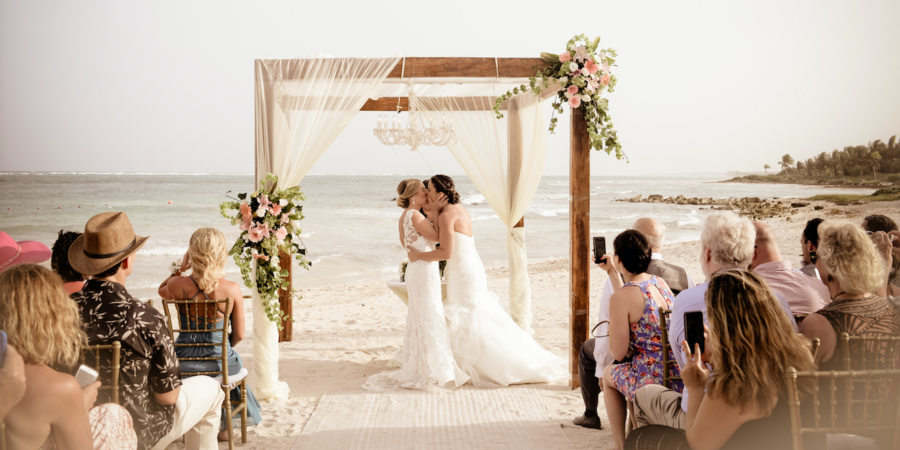Noel Koenke grew up in a conservative Catholic home, and her faith was deeply ingrained in all facets of her life. She only attended Catholic schools, and she even pursued a master’s degree in theology, later becoming a campus minister at La Salle University in Philadelphia.
Meanwhile, Koenke always wondered why she struggled to form deep relationships with men. In her twenties, already well into her career path in Catholic ministry, she fell for a woman for the first time and eventually realized she was gay. She stayed in the closet at that job, but when she accepted a position at St. Joseph’s University in Philadelphia to be a campus minister, she decided it was time to come out.
While she was initially met with support at work, before she married her first wife, she was asked to hide her marriage and to use “discretion” and “prudent judgement,” because she could put the school’s Catholic reputation at risk. While at that job, Koenke divorced her abusive first wife, and then later married her current wife Adrianne last May. But Koenke always had to be cautious about who knew about these major highs and lows, which nearly broke her. Living under the conditions requested by the school caused such stress and anxiety, she wound up in the hospital for a month in 2017, trying to find the will to live.
After years of struggling to live a double life, Koenke felt forced to resign last fall after seven years at her job. When she left ministry, she also left the institutional Catholic church, which was terrifying at first, but has left her with a strengthened sense of spirituality and faith. The 34-year-old and her wife currently live outside out of Philadelphia, where she has created a business selling CBD hemp oil products to help others with mental health struggles.
In March, Koenke published a beautifully written piece about her experience in the National Catholic Reporter. She posted a link to it in Pantsuit Nation, a massive private Facebook page that was originally created to support Hillary Clinton’s presidential candidacy, but has since turned into a supportive place of connection for progressive-minded people. That post is how we first found out about her, and much to her surprise, her post received thousands of likes and hundreds of comments.
“I didn’t expect the kind of response I got to that — it’s been a complete surprise to me as to how many people have reached out sharing similar stories,” Koenke says. “It’s affirming for me too, since the decision to resign was so difficult.” This is Koenke’s story of living two lives, leaving Catholicism, and learning who she really is and what she’s made of.
Profiles in Pride: When did you know that you were gay, and what was it like coming out as a Catholic?
Noel Koenke: It was extremely difficult. I grew up in a very conservative Catholic home; my dad was an alcoholic and he and my mom were both were very rigid Catholics, so I was extremely sheltered. My parents were so involved in the church that they were skeptical of me even having friends in public school. I realize now that I was so confined. I went to Catholic grade school, Catholic high school, and Catholic college. I received two degrees in theology and worked in both a Catholic high school and Catholic university. Other than the one year I was a flight attendant, I had never been outside the church.
I didn’t come out until my early twenties. I was originally engaged to a man who cheated on me, so I called off the wedding. When I moved to Philadelphia, I took a job at La Salle University in campus ministry. I joined a gym in the area and my fitness instructor was a woman. I started having these feelings for her that I’d never felt for a guy, and I’d always wondered why I didn’t. In high school, my friends would be talking about boyfriends and I tried to hang with the conversations, but it never fit well for me. But I didn’t have experience or anyone explain to me what that could be…what I could be. I was so sheltered, I just didn’t know.
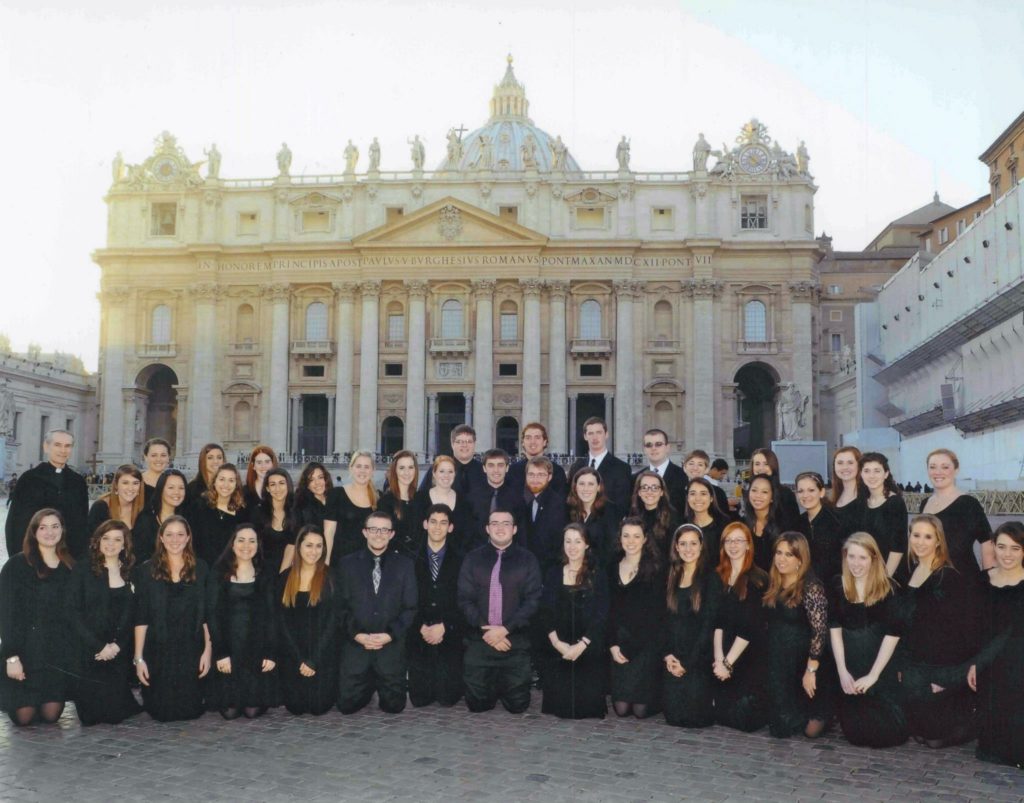
In college, I always wondered, “Why can’t I be in a long-term relationship with a guy; what’s wrong with me?” I still tried dating guys, while also trying to figure all of those things out. The reality was that I was just gay and didn’t know it. So in my twenties, I joined this gym and I saw my fitness instructor, and I was like, “Oh my God, I have these feelings that I didn’t have before, what is this?” As I started to explore that, it was so difficult because I was already involved in a job in ministry. With all of the education I’d gone through and all the work I’d put in, I was so afraid to come out. I didn’t come out fully when I was at La Salle. I came out publicly at St. Joseph’s within my first year, because I just could not live a double life again.
What was hard to understand is that when I came out at St. Joe’s, people were excited in a way; I was told by the VP of Mission at the time, “This is great, now we have someone who can talk to the students about what it’s like to be gay and Catholic and they will have support.”
So I had a lot of affirmation when it first happened, but as soon as I got married, everything shifted and changed. Then it was like they wanted me to be quiet. I remember telling my boss, “It feels like you’re asking me to back in the closet.” He said, “I know that’s how it seems.” In his defense, it was hard for him; he was crying when he was giving me this message. I was told the “administration” was afraid of the bad press and possible tension with the Archdiocese if it came out that they employed someone in a liturgical position who was gay and married.
PIP: What was it like having to resign from a job because you were gay? How did it go down?
NK: So in 2013, I was in a relationship. It was an abusive relationship and I got married, thinking it would make things better, but it didn’t. A few weeks before the wedding, my boss came into my office, shut the door, and told me that the administration was asking me to not be public about my marriage. I said, “I don’t understand what that means, because the school has been supportive of me being gay.” He said they were afraid that conservative, Catholic groups would report me to Archbishop of Philadelphia and it would cause tension between the school and the Archdiocese.
The Archbishop couldn’t directly fire me, but he could threaten the university in removing their canonical status, meaning that they could no longer identify themselves as a Catholic school. I’m not angry with St. Joe’s; I think they did what they could to keep me employed, which was to ask me to hide it.
But I don’t think either of us realized what that does to a person or how that can completely create a psychological break, because you’re constantly thinking about how to live two lives. I don’t think people realize how often our spouses come up in conversation or how hard it is to try to keep their gender “discreet.”
When I was asked to do this, I said, “What does that mean, hide it, be discreet?” He suggested, “Take down your Facebook or remove any students or people associated with the university.” Then I asked, “Can I have a picture? Can I wear a ring? Am I supposed to lie?”
He didn’t clarify, and I later received a letter that the university would not take a position on any of those questions. That’s really highly stressful being told not to be public and to use discretion and prudent judgement about my marriage, but not being given any conditions around what that looks like. I sent a letter to the VP of Mission at the time, telling him that I wanted in writing that I wasn’t going to lose my job, because that was my biggest fear: if I don’t abide by these conditions, will I get fired?
He initially said, “You’ll never get that in writing.” However, I did end up getting a letter that said I would not be fired for my sexual orientation or marital status, but that I would still continue as an at-will employee, which means I could be let go for any reason. After that, I never really felt safe. I was relieved I hadn’t gotten fired, but having to censor what I could say about my marriage with people, and needing to pre-determine their religious views before I could answer a simple question like, “What did you do this weekend?” was beyond stressful. I would sometimes stop myself mid-sentence and think, “Do I use ‘he’, ‘she,’ ‘roommate,’ ‘friend,’ or try to find an elusive way to word an answer without revealing the gender of my fiance/spouse?” It caused me so much anxiety and ultimately made me feel worthless.
It was so confusing to me. There were times where in back-to-back conversations, I would have to change my pronoun usage. If I did a Mass for the Board of Trustees or was talking with someone I knew had conservative religious views, I’d just go along with the conversation when they assumed I was with a man. I was too scared to say otherwise. When there were comments about my engagement ring and I didn’t know their views, I’d use “he” or try to find a way to not use a pronoun at all in those conversations. With my direct colleagues who were OK with it, I could use “she” pronouns. Every year with new students, new parents, and new employees, I never got a break in trying to navigate their request for “discretion.”
I met Adrianne shortly after my marriage with my first wife ended. So trying to finagle how to have those conversations after four to five years, I didn’t even know who knew what anymore. I would wonder, “Do you know I’m with a girl or a guy? I’m not even sure.” Despite the crazy stress of being a liturgist, it was even worse having to figure out what to say in some conservations, or how authentic I could be with certain people.
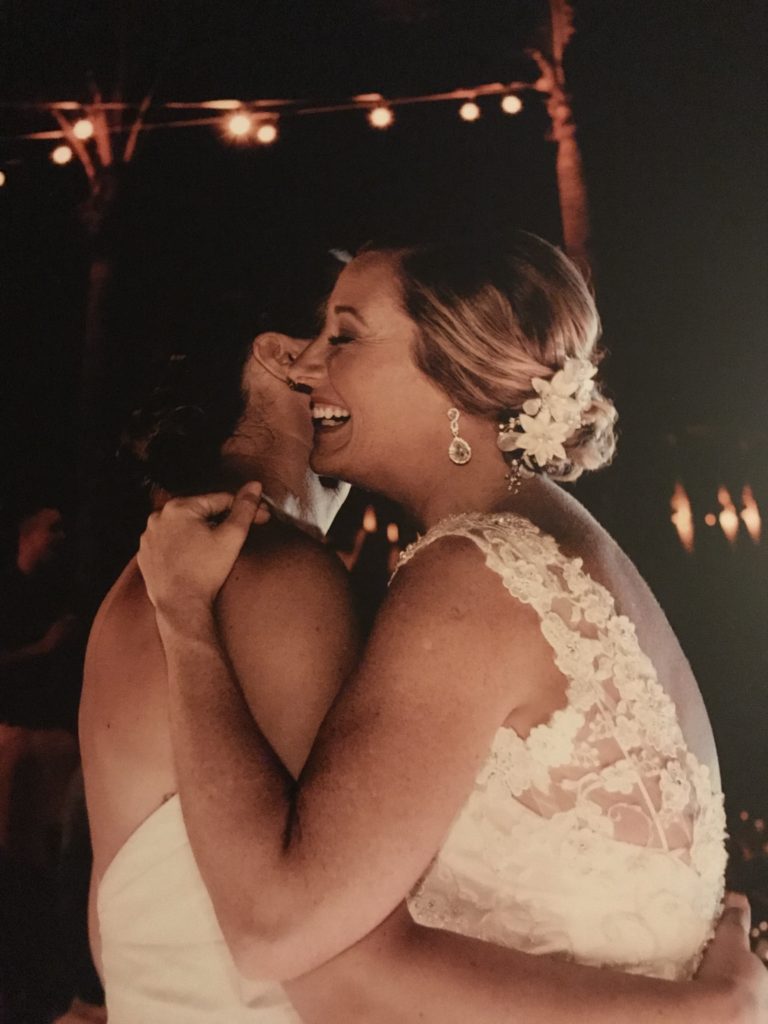
In the beginning, it was easy to remember and I thought I could do it. So many people told me, “I don’t know why you’re staying there.” I said I love what I do for the students, I’m a great campus minister, and if you talk to any of my students, I have letters upon letters of positive feedback from them. I was even given a promotion two years ago, so it wasn’t my work quality — it had nothing to do with my ability to do ministry, but I still couldn’t be my authentic self. It was a double message all the time; you’re good for what you do for us, but not for who you are.
Adrianne eventually was like, “You come home from work and you’re so miserable and you’re so sad, and I see you struggle with this day in and day out, never knowing what you can say, what you can’t say, who you can tell, who you can’t tell.” She said it was killing me. It put me in the hospital. It just broke me. But she stood by me through the whole thing.
This is a problem I’m seeing a lot. This is going on all over the country, where people are asked to be secretive or are being fired for fabricated reasons like insubordination after being somewhere for 12 years or more. It’s crazy! Why aren’t people enraged about this? When I told the university how working there was affecting my mental health and how I could no longer continue under their conditions, I asked to negotiate a severance. I was still receiving medical treatment and didn’t know how I would be able to pay my bills.
After being told they did not have to offer me anything, I was, in fact, offered a severance package, but it came with a nondisclosure silence agreement. So if I wanted any money and health care, I would have to sign away my whole experience. I said, “No, I can’t do that, that’s me signing off four to five years of my life, and it wouldn’t allow me to explain anything to my students or other university colleagues I’d worked with.” That just wasn’t an option for me.
When I finally left in the fall, it was just this reality of like, oh my God, what am I going to do with my life? And am I even going to tell people about it? I didn’t take that silence agreement, but am I even going to find the courage to tell people about what happened because of the fear?
I think with the Catholic church, many people live in a state of irrational fear of “what can they do to me…what will they do to me,” as well as this guilt and shame that comes along with being Catholic. I think so much of my experience day in and day out was wanting to stand up for myself, but also knowing that the Church comes first — I do not come first. That’s a hard line.
When it first happened, I thought, “Do they have the right to do this? What am I going to do; can I even fight it?” I talked to a discrimination lawyer who at first thought I could fight it, because the university receives federal funding. How can they discriminate against people if they’re receiving federal funding from the government? Except there’s a law called ministerial exception. If I had any other job in the university — if I was a janitor, an administrative assistant, even a professor — I would have been legally protected.
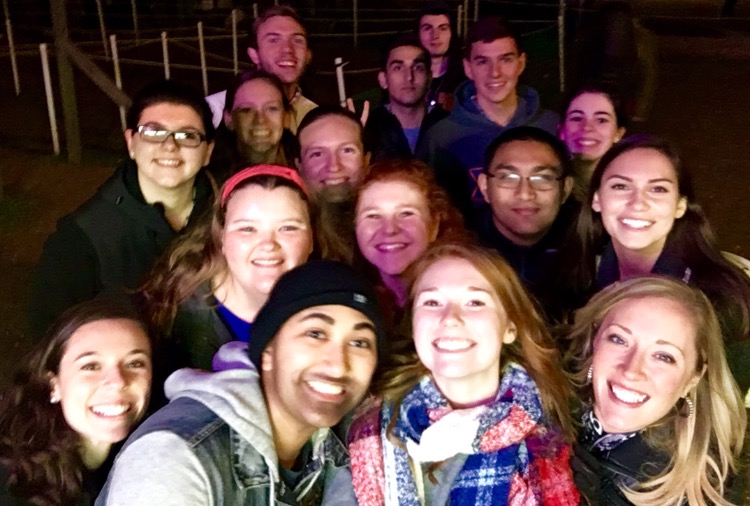
But because of my position in liturgy, I was exempt not only from federal non-discrimination law, but also the school’s own non-discrimination policy that says they don’t tolerate discrimination based on sexual orientation. It’s just mind blowing. I even said, “When I started my job, I sat through the new employee orientation, and nowhere in the non-discrimination policy of the school does it say campus ministers are exempt from this policy.”
I actually remember seeing the policy at my orientation and being both surprised and excited knowing I was protected — it is rare to find at a Catholic school. There are many Catholic schools that intentionally leave sexual orientation out of their non-discrimination policies. I thought to myself, “This is actually a Catholic school that will allow me to be who I am.” Then I come to find out, that’s really not the case.
PIP: Has your family been supportive of you throughout this?
NK: My parents haven’t; they did not come to my wedding, and they still don’t consider my marriage a marriage because it’s with a woman.
They think “love the sinner, hate the sin.” But it’s not a sin when love is involved. Love is actually the opposite of sin.
We try to have a relationship, but they don’t want to discuss my marriage, so anytime I’m home, I don’t know what to talk about, because my relationship is infiltrated into every element of my life. It was always so hard to navigate that with them. But they’re very strict Catholics, and in their mind, if they supported me, they think they’d be sinning and condoning what they consider to be a sin as well.
PIP: You wrote that after leaving organized religion, you were surprised at how well you cultivated a new sense of spirituality. What was this like for you?
NK: What’s crazy is, I think when I was working in ministry, there was always this subconscious sense of sadness because I couldn’t be who I was. When you talk about ministry or authentic ministry and you’re talking about God, it requires an authentic expression of self. And we experience God most in our relationships, because God is love. So how is it possible to be an authentic campus minister when I can’t freely be who I am and talk about who I love? That was really difficult for me.
I’m a really good rule follower; I always have been, and it’s probably why I got straight A’s and was valedictorian and did all church things so well. It was hard because I loved my religion as a child.
I don’t think religion in itself is bad, but I think when it causes separation in relationships or families, where they’re forced to choose their child or their faith, or it causes division when you’re saying we’re one body of Christ, but some of you are not OK or you’re not welcome here, there is a problem. Or you sing songs like “For everyone born a place at the table” and “All are welcome,” but they’re really not.
These hypocrisies happen within the church all the time, and as I studied more and more into my master’s program, I became even more aware that the institutionalized Catholic Church is a business, and it’s successful because they teach you these concepts so young — most people never even think to question them.
Research in religious trauma explains it’s so hard for people to break away from some religions because as a child you’re taught things that are irrational or illogical. When you grow up, you still believe that to be truth. So when someone presents you with anything that’s rational or a logical explanation, you say, “No, it’s a mystery, and that’s OK for me, because that’s what I was taught.” It’s almost like you never “grow up.” And you don’t know any different unless you you pursue higher levels of theology or really seek to understand — you say, “Hold on a sec, where does that even come from? Why was that teaching created? Who developed that teaching?” You start looking back through history and start putting the pieces together.
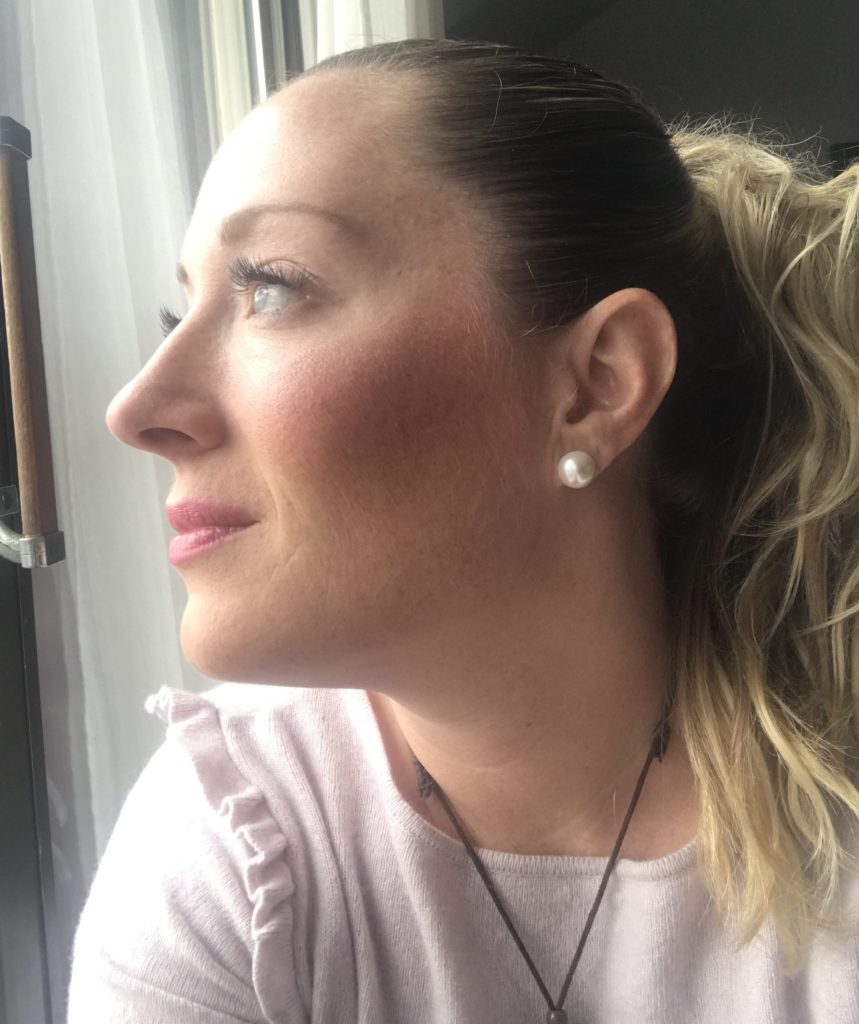
When I broke away from religion, I thought I was going to lose my faith. That’s why I was so scared to do it. I thought if I don’t have my religion and go to church every Sunday, and I don’t have those things keeping me faithful and coming back, I’m going to lose my faith. It was actually the complete opposite. Probably the reason why I was able to publish that article is because I feel so passionately about where my life is and how spiritual I feel now, because I do see God working in all things.
I trust so much more deeply because it’s not like I’m trusting a rule or a principle to guide my life; I’m really trusting the Spirit to guide me. It creates a sense of trust and spirituality I never felt with the church, despite the thousands of times I went to Mass, and the endless hours of reading, prayer, and work.
I find for many people, when I talked to my students or even adults in the Catholic church, they may be religious, but their spirituality is nonexistent. You know, “I’ll follow the rules and go to church, but I don’t feel it and I don’t see how this applies to my life or my decisions, or my choices, or how I vote, or where I contribute my time and money.” There are so many things I was recognizing, and finally realized much of what Jesus came to change about the religion in his time is simply being repeated in our modern times. I know I’m not the only one seeing this.
I think especially with the Catholic church, what you’re seeing is a movement of people, especially millennials, realizing that although these rituals are beautiful, and they do have a lot of symbolism and great meaning, the practical reality is that the Gospel message of love and acceptance is not being lived. So you’re saying these prayers and preaching these things, but you’re not living them. So now, it just looks like a lie.
Despite leaving organized religion, I think my spirituality has soared. I have all of these unknowns, and sure, I’m anxious about where my life is going, but there’s also this trust in saying, “You know, I’ve been led this far and I know that all of this is for a reason; I know that all the trauma I’ve been through, all the experiences I’ve had in my life, there’s a reason for this.” I’m not exactly sure where I will end up, but I also don’t need to know that. I’m going along for the ride.
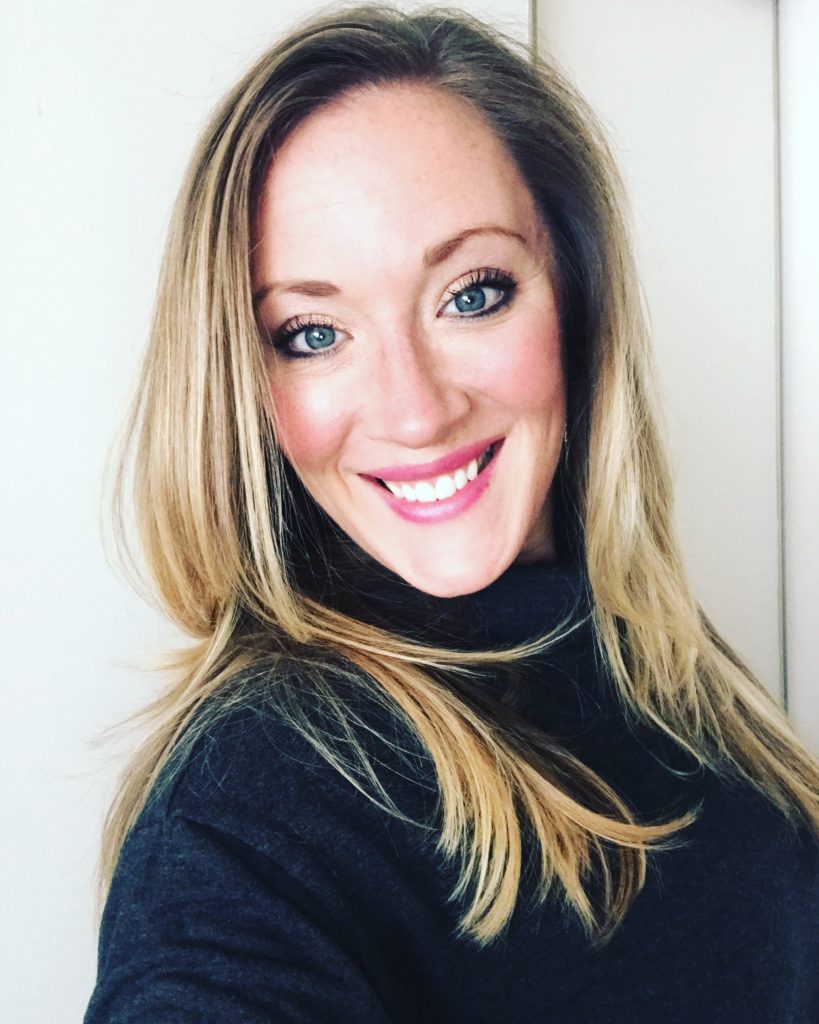
PIP: I’ve heard many LGBTQ+ people say they’ve been burned by religion, so there can be some judgment toward those in the community who are still people of faith. Do you think these two things can peacefully coexist?
NK: What I found is that people always respected my religion, but I also know that there is so much pain in the gay community, because there is a large percentage of people who were former Catholics or who still say they’re Catholic but aren’t sure how they fit in it.
I hear the pain of many people who really do love their faith, but they had to make the choice between continuing to go to into a building every week that makes them feel shameful or guilty or less than or not equal to or not worthy or sinful. When you continually get those messages, you start feeling horrible about yourself. You’re trying to live your life in a way where you’re pursuing happiness, but even just building your self-worth is nearly impossible. That’s where I’m finding a lot of resentment coming from the gay community surrounding the Catholic church.
Now, some people have been able to find a few Catholic communities that are welcoming, and there are some very progressive Catholic churches that welcome those who have been marginalized. The problem is that while there might be a few communities that are welcoming, they are still part of an institution that does not respect us, doesn’t accept us fully, and I’m sorry, but it’s hard to feel welcomed and part of the Body of Christ when we know that.
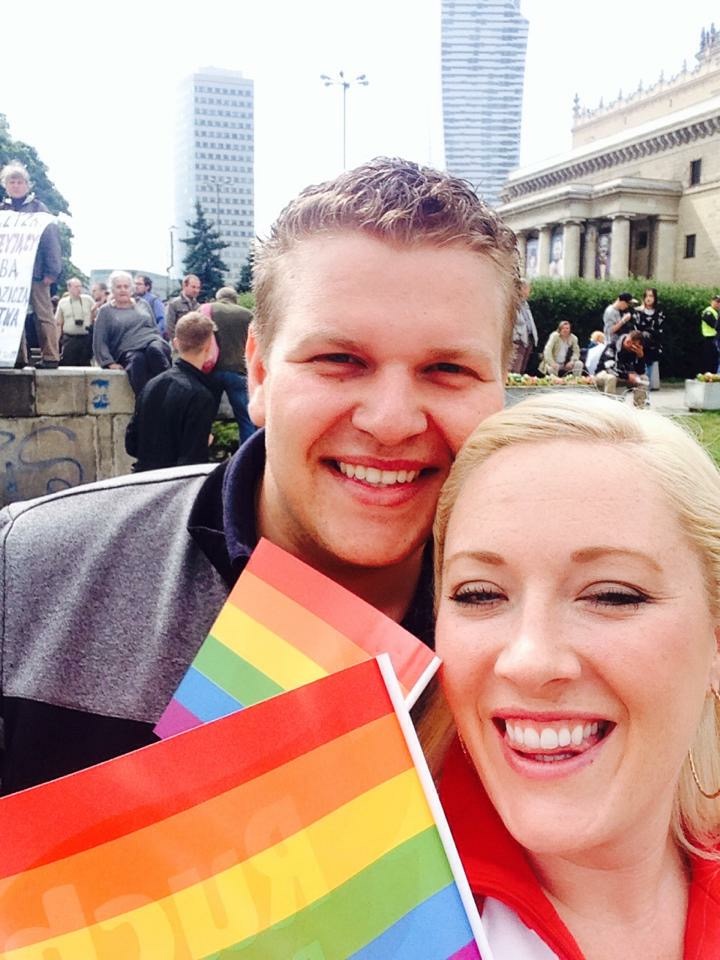
Because trying to stay was my idea too; I said, “I’m gonna stay and change it from within, I’m gonna keep on trying to live my faith and be gay and show people that it’s possible.” But you sacrifice yourself, because in the end, you’re still contributing to an institution that at the top, doesn’t accept you. That’s a harsh reality. Yeah, you might find a church here and there, but then why are you contributing your money, time, and talent, when at the top, it must change?
That’s one of the main problems in the Catholic church. There’s one group of people that are making decisions and it’s generally middle- or upper-aged white men in power. And that’s a problem, because they’re only seeing things from one perspective. While I think Pope Francis has at least opened the door for women to be part of the conversation, they still don’t have the power to vote and aren’t making change in the hierarchy. That’s the real issue: it’s a one-dimensional church, not a multi-dimensional church. How can you claim to understand and convey who God is and how God loves from only one point of view?
PIP: Tell us about your new business, The CBD Angel!
NK: Yes! Who thought I’d ever been in this area? Isn’t this great, I went from Catholic to cannabis! So I have very severe PTSD. I had two sexual assaults in my twenties, grew up in an alcoholic home, then also having an abusive spouse for my first marriage, and my double life at work, I just had very high anxiety and panic attacks. I’ve been on different medicines, but when you take a pharmacological medicine, yes, it may help with some things, but you can have side effects like loss of libido or weight gain.
As I started to get healthy — my wife is a nutrition and fitness expert — I lost 60 pounds with her. I didn’t want to be on pharma meds, but I also knew I need something because of the PTSD. I was on a clinical trial for PTSD at one point, and coming off it was so awful, I wondered, “What else is out there to help? Are there other alternative forms of healing or treatment for PTSD?”

I discovered that hemp CBD is really effective for anxiety and depression, which so many people struggle with. I started using it and I was able to lower my medicine. I still take some medication, but not as much as I had been, and I feel so much better on the hemp CBD than I ever felt on pharma meds. Because it is hemp CBD, there is no high or psychotropic effect, which is why you can legally buy it. The side effects are simply more health benefits.
PIP: Thank you for sharing about your mental health struggles. So many people suffer in silence and think they are alone.
NK: I think it is important to talk about, allowing myself to be vulnerable and tell my story. It is amazing how many people are struggling with the same things but don’t feel comfortable talking about it because they don’t want to be judged. I know we’re really trying to break that mental health stigma, but it still exists today. If everybody was very honest about their lives, there wouldn’t be as many stigmas, or even insecurities when you realize, wow, a lot of people are suffering and are going through the same things I’m going through.
I think there’s a lot of shame around abuse and rape or growing up with an alcoholic or if you’re divorced. “Oh, well you fucked up.” No! That relationship wasn’t good and it was compromising your self-worth. That’s OK. That’s the other thing I’m finding within the church. There is a huge shift that’s happening. That’s why I’m hopeful for the future of the Catholic church if those rising to power can continue that growth. For example, many in the millennial generation are coming from single-parent families or parents that have remarried. They’re saying, “You’re telling me my mom can’t receive communion without an annulment? That’s crazy!” She tried so hard but my dad was abusive, or whatever the circumstances were. It doesn’t make sense to hurt her more by keeping her from the Eucharist.
They’re also growing up watching the LGBTQ community slowly and surely being accepted in society. For many, it isn’t going to make sense to them that the church, who identifies with the Gospel message of love and acceptance, doesn’t fully accept the LGBTQ community.
There is a shifting with the younger generation. The biggest problem is that people are so afraid to speak up, because you really are brought up in the church to be afraid. Your ideas don’t count; it’s what the church says and that’s what you abide by.
As I tell my wife more and more about what I was taught, I think to myself, it’s brainwashing in a lot of ways. They would say, “If you’re involved in a homosexual relationship and living in sin, you’re no longer in a state where you can discern God’s word clearly. Your ability to discern will be called into question because you are living in sin.” How can you ever learn to trust yourself or your feelings, or your experiences when you have been taught to only trust the church?
Having worked with priests for so long, I feel sad for many of them. Many are gay men who probably felt they had no other option but to join the priesthood because they knew they were gay. Since the majority of priests are older in age, they grew up in a society where being gay was unacceptable in almost all communities. It makes sense that many may have built up anger and resentment about not being able to live the life that they were created to live, and those are the people who are making decisions for other people, interpreting who God is and determining the teachings.
That gets really dangerous on a lot of levels. Because if you ever make a decision out of resentment, aware of it or not, it is most likely going to be hurtful. It’s also very rare to leave the priesthood because you make a lifetime commitment, so even if there is a true desire for something else, most will never leave. I will say there are some are very, very good priests who entered into the priesthood for the right reasons, and I know plenty who disagree with how the LGBT community is treated. I’m sure it is hard for them.
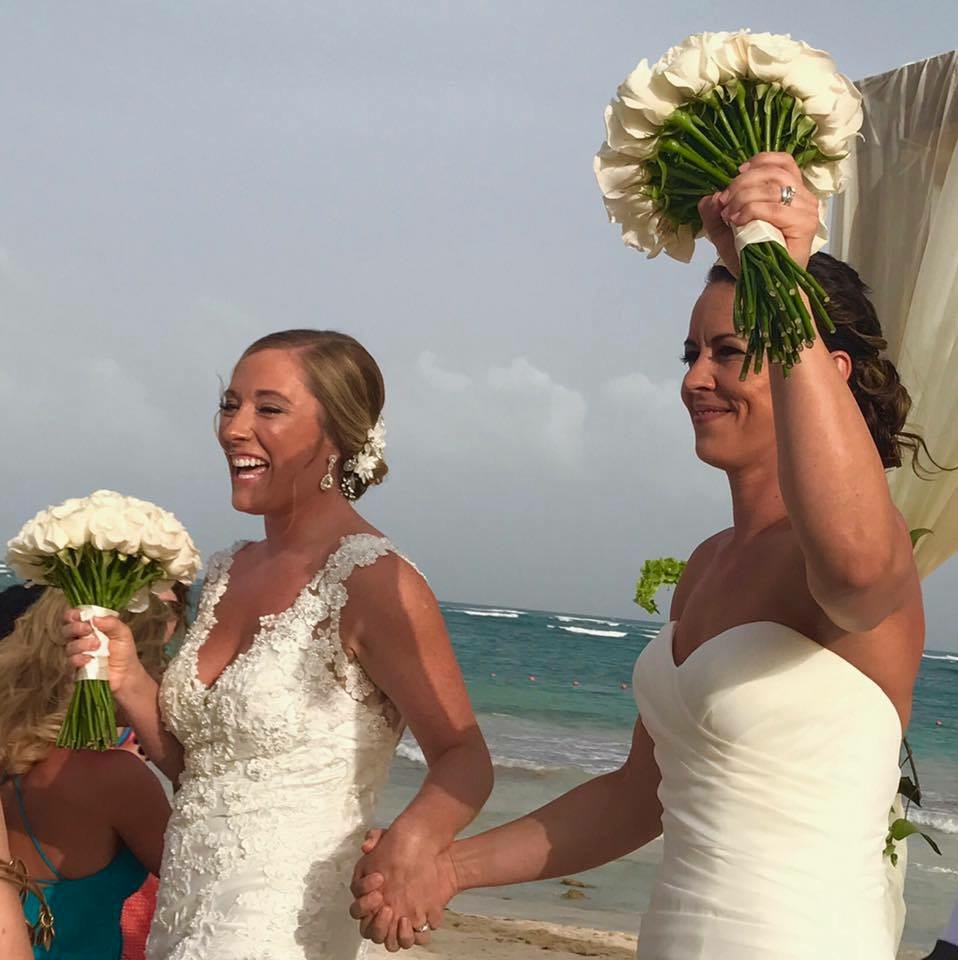
PIP: What else have you learned from everything you’ve gone through?
NK: I think for me, the greatest thing I’ve learned is to no longer make decisions based in fear. I think that’s what kept me in the church for so long — the fear of “who am I going to be without my faith?” or the fear of “I’m going to lose my entire community.” Or the fear of “what am I going to do with my life?” The church was my life.
But any decision made out of fear is not love and it isn’t of God. When I stopped making decisions based in fear, and really started trying to listen to my own intuition and how God works within and through me, was when I realized how life outside the church is beautiful and even better than I ever thought possible. I think that was the biggest thing for me — living in the church never gave me the glimpse of the life I’m living right now. I don’t want to sugarcoat it that it’s easy; it’s been challenging as all hell and I’m still trying to love the ‘Catholic guilt’ out of myself. But every choice or decision I’m making are a result of the spirituality I’m nurturing and growing with God, or the Universe, and I like to use those interchangeably.
It’s hard to walk away from the comfort of all I’ve known, for sure, but I no longer feel like I’m dying inside. The world outside the church is new to me and it’s unfamiliar, but I also see how strong I’m getting being true to myself for the first time in my life.
In the end, I know this is all worth it and it will all make sense. All I can do is live the rest of my life fearlessly, with a desire to spread the message of radical love, in hopes of changing and healing our world. The best is yet to come.

